|
|
|
| |
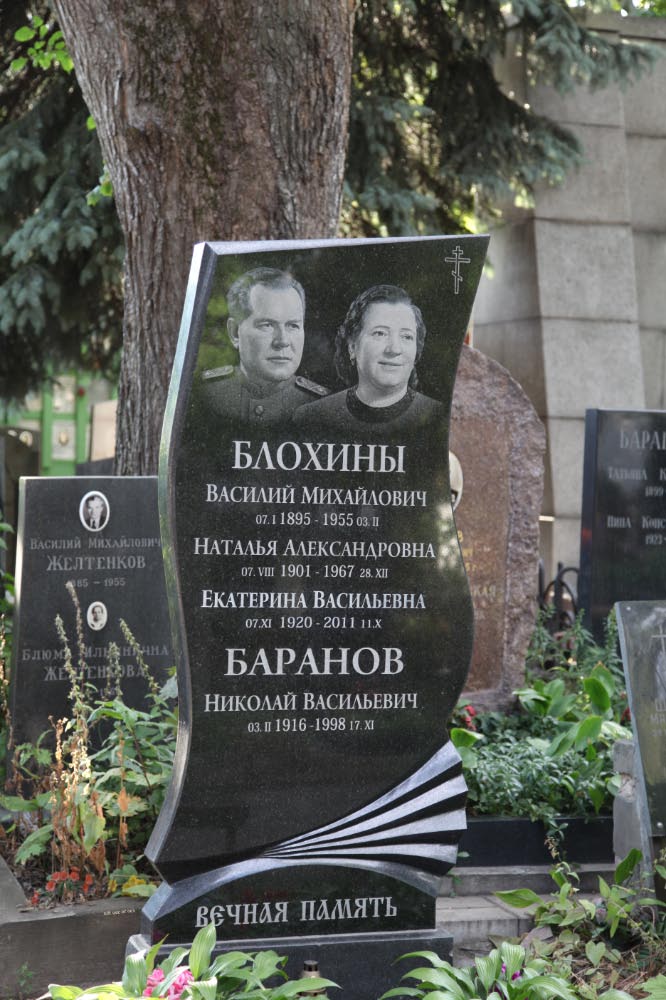 |
|
| |
Не акт Церкви или государства ... или?
|
|
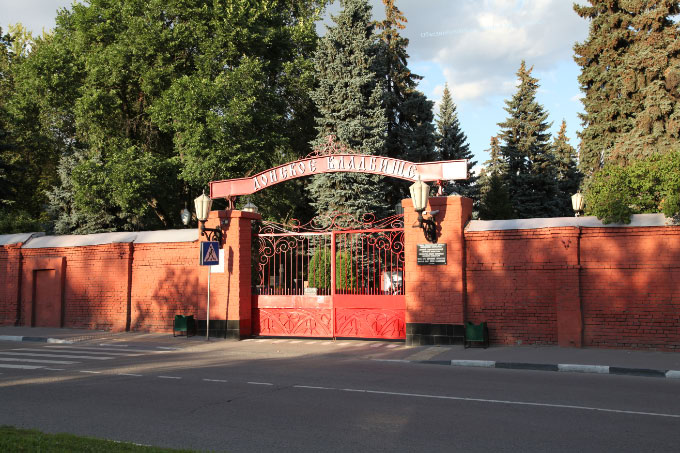 |
|
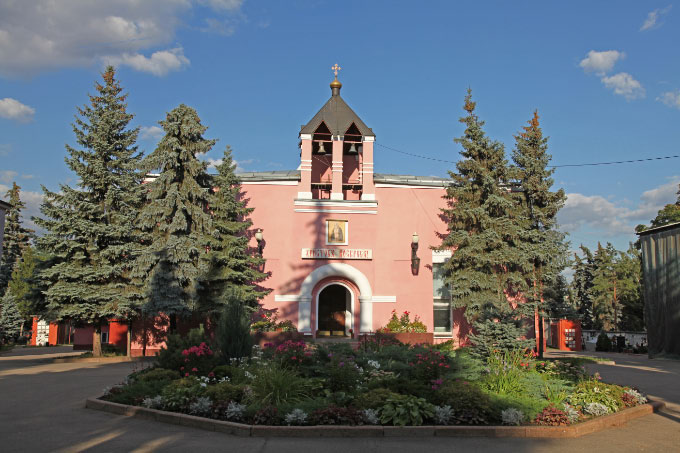 |
| Новое "Донское" кладбище в Москве – New "Donskoy" Cemetery in Moscow |
|
Church of Saint Seraphim, then Communist murderer's crematorium, now
again a church, in this place. Церковь преподобного Серафима, то
крематория Коммунистической убийцы, теперь снова церковной, в этом месте.
|
| |
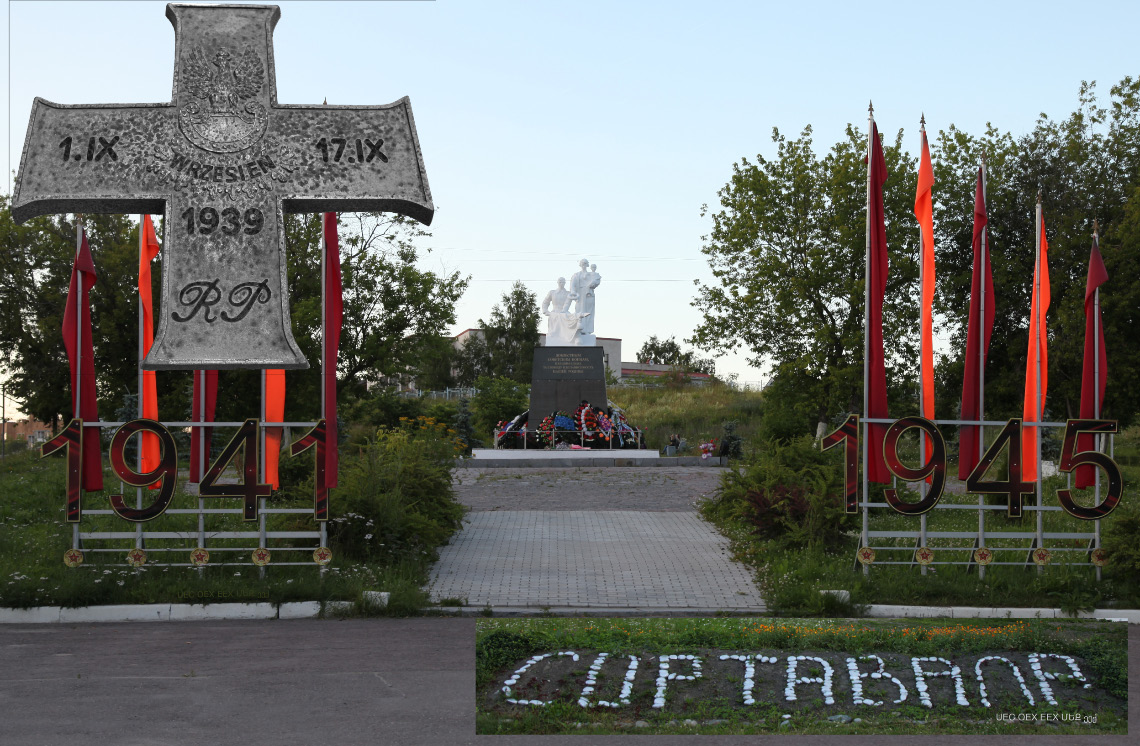 |
|
| |
The World War II – Вторая Мировая Война memorial to the fallen of the Soviet Union is in Сортавала – Sortavala on the northern shore of Ладожское озеро – Lake Ladoga. The inset Polish Cross with the real dates for the beginning of Phase II of the Great Civil War of European Christendom, 1914 - 1945, is from the Katyn War Cemetery – Polski Cmentarz Wojenny w Katyniu – Мемориальный Комплекс «Катынь». |
|
| |
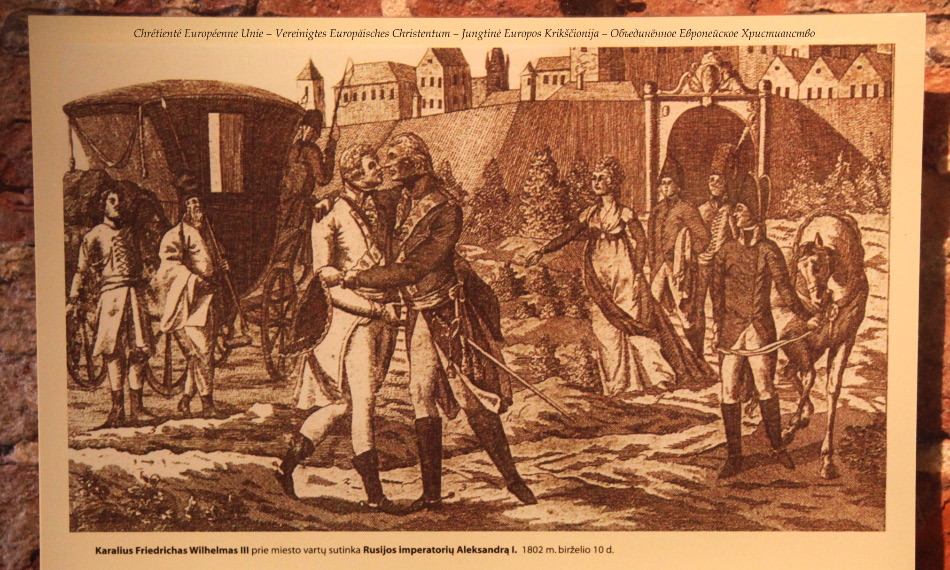 |
|
| |
Better times for German - Russian relations, though so very often we seem to need to find a common enemy, or have enemies find us, like Napolean or the Turks, or now in the XXI century, Muslims and Jews and Homosexuals and Plutocrats. Here in a castle museum in Klaipeda in Lithuania, a print memorializing a meeting of brother sovereigns in European Christendom, König und Kaiser Friedrich Wilhelm III (3 August 1770; reigned from 16 November 1797 to 7 June 1840) and Tsar-Emperor Alexander I – Александр I Павлович (23 [O.S. 12] December 1777; reigned from 23 March 1801, from the date his father, Pavel, was murdered, to 1 December [O.S. 19 November] 1825, when he died or, according to another version, got tired of kinging and ducked into a monastery.) Alexander's younger brother and successor, Tsar-Emperor Nicholas I – Николай I Павлович (6 July [O.S. 25 June] 1796; reigned from 1 December 1825 to 2 March [O.S. 18 February] 1855) took as wife the first daughter of Kaiser Friedrich Wilhelm III, Prinzessin Charlotte von Preußen (1798–1860), who thereafter was restyled Императрица Александра Фёдоровна – Empress Alexandra Fyodorovna of Russia, thereafter mother of Emperor and Tsar-Liberator Alexander II. Indeed, nineteen-years-younger, little brother Nikolai was taking after older brother Alexander in this regard also. Alexander, who took for beloved bride German Luise Marie Auguste Prinzessin von Baden (* 1779 to 16 May [O.S. 4 May] 1826 †), restyled with marriage Императрица Елизавета Алексеевна – Empress Elizabeth Alexeievna of Russia. Two more unions piling on more proof of the absurdity which coupled the evil of internecine, fratricidal war between Germany-Austria and Russia-Ukraine. This meeting of Frederick William and Alexander in Klaipėda, when it was Memel of Prussia, on 10 June 1802 was under rather more auspicious circumstances for Frederick than a later visit to Memel in 1806, fleeing Napoleon's Grande Armée. |
|
| |
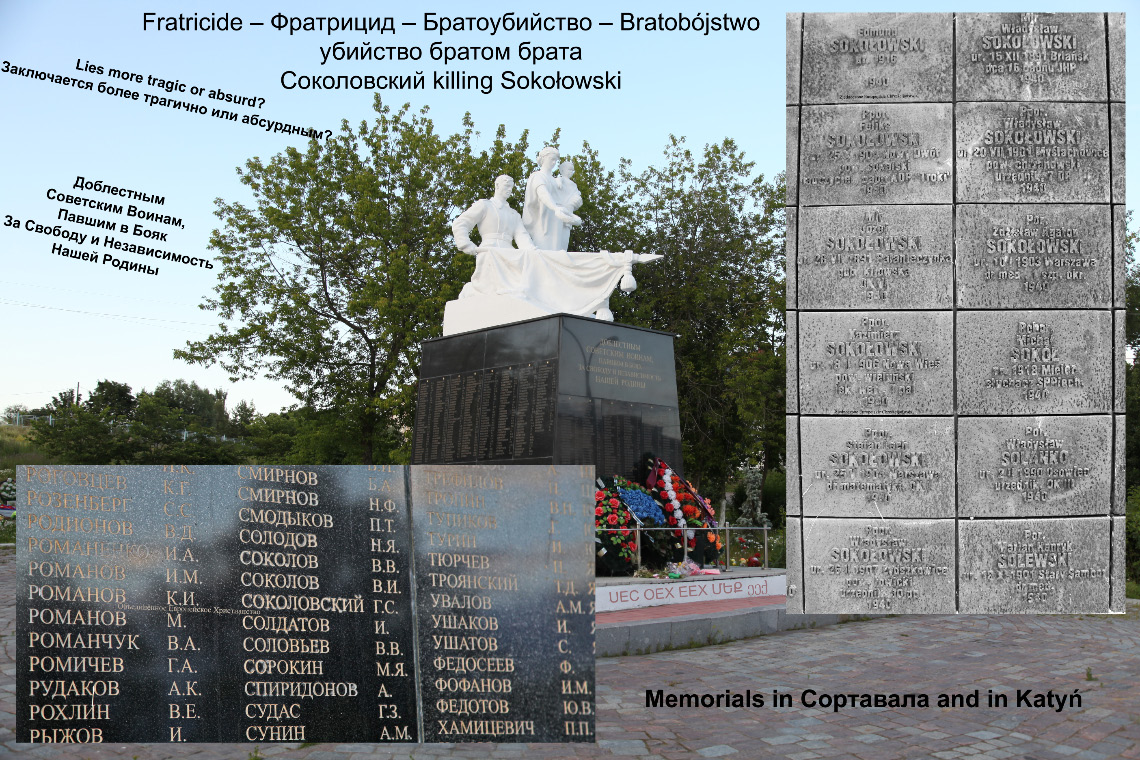 |
|
| |
Соколовский killing Sokołowski Memorials in Sortavala – Сортавала and in Katyn – Katyń |
|
| |
|
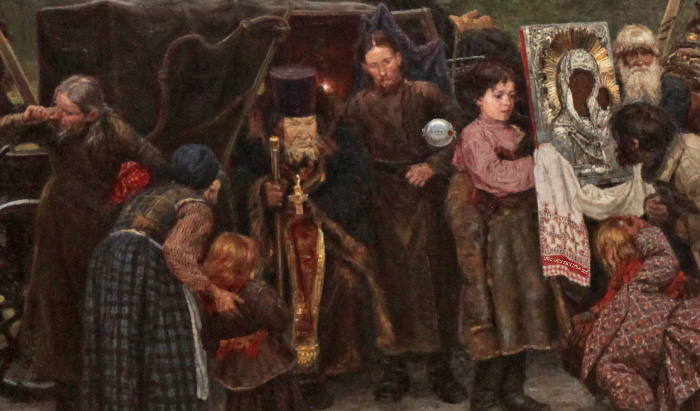 |
| |
|
Встреча иконы, Константин Аполлонович Савицкий (1878) -
Icon on the Road, by Konstantin Savitsky, Передвижных |
| |
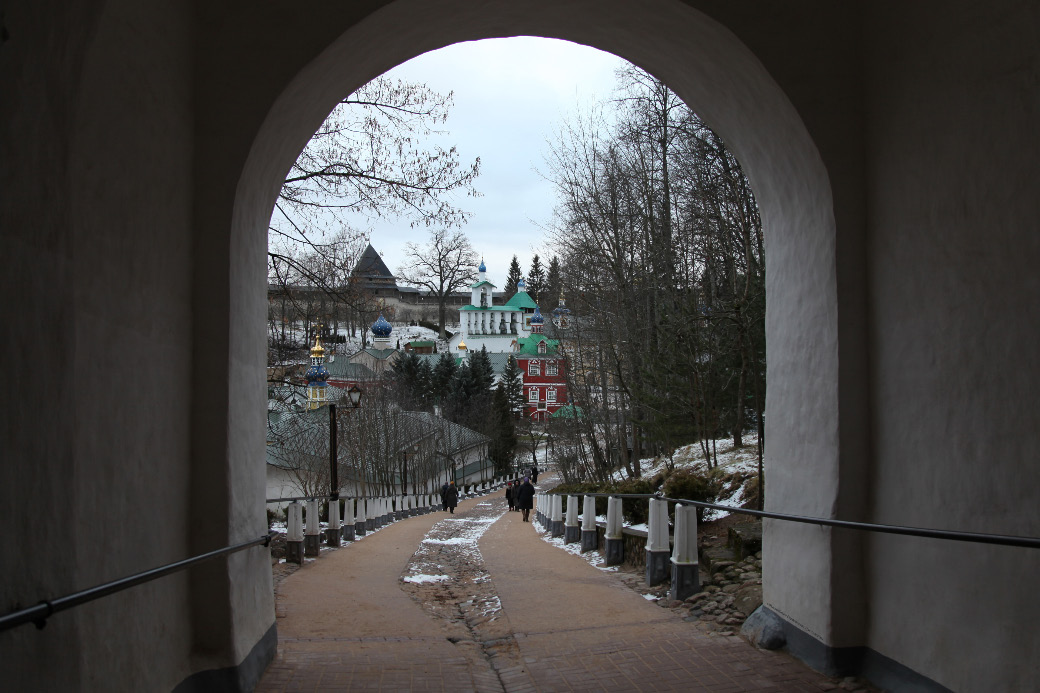 |
|
| |
Свято-Успенский Псково-Печерский Монастырь – Holy Dormition Pskov Monastery of the Caves |
|
| |
|
|
| |
The official site of the monastery (www.pskovo-pechersky-monastery.ru/eng) includes the following description:
The Holy Dormition Pskovo-Pechersky (Pskov-Caves) monastery is located on the historically Russian land, 50 kilometers to the west of the city of Pskov, near the very border of Estonia and 340 kilometers from St. Petersburg.
The date of the monastery's foundation is considered to be August, 15/28,1473. It was on that day that the monastery's founder, St. Jonah (Shesnik) consecrated the church of the Dormition of the Most Holy Mother of God — a church which was built into the hillside. But the monastic life had actually begun there much earlier, when a few hermits, seeking solitude, came to live in the caves. The holy relics of one of them, St. Mark the desert-dweller, still rest in the caves and many people come to venerate them. The monastery's chronicle relates that "the Most Pure Virgin herself chose this site in the valley of the Kamenets spring, blessed it, exalted it through her chosen people and has been protecting it ever since. Five centuries have passed, and the monastery has seen both glory and tragedy, but never have the holy lampadas gone out, nor prayer ceased in this blessed place.
...
In the 16th and 17th centuries the monastery suffered from numerous attacks by the "Latins" — Polish and Lithuanian troops, as well as by the Swedish and German soldiers. The most serious attack was lead by the Polish King Stephan Batory in the autumn of 1581.
...
In 1920 the town of Pechory, in accordance with the Tartu Agreement, was given to Estonia, and the monastery found itself outside Russia. This new situation did not affect the church services in the monastery — they never ceased; however, the new authorities caused a lot of problems and distress to the brethren.
Which fits nicely with the preferred narrative of Russian holiness interrupted by unholy foreign intervention, although this narrative is almost devoid of integrity, and indeed it is nearly the mirror opposite of the truth. In fact it was the circumstance that Pechory and the Pskov Monastery of the Caves were assigned by treaty to Estonian government during the period of 1920 through 1944 that saved the monastery from the murderous rampages en masse of the Bolsheviks and their ugly godless and anti-Christian experiments, to which the Russians succumbed, but which had to be imposed by the Soviets militarily elsewhere in Europe.
... Well ... the buildings are beautiful. |
|
|
|
|
| |
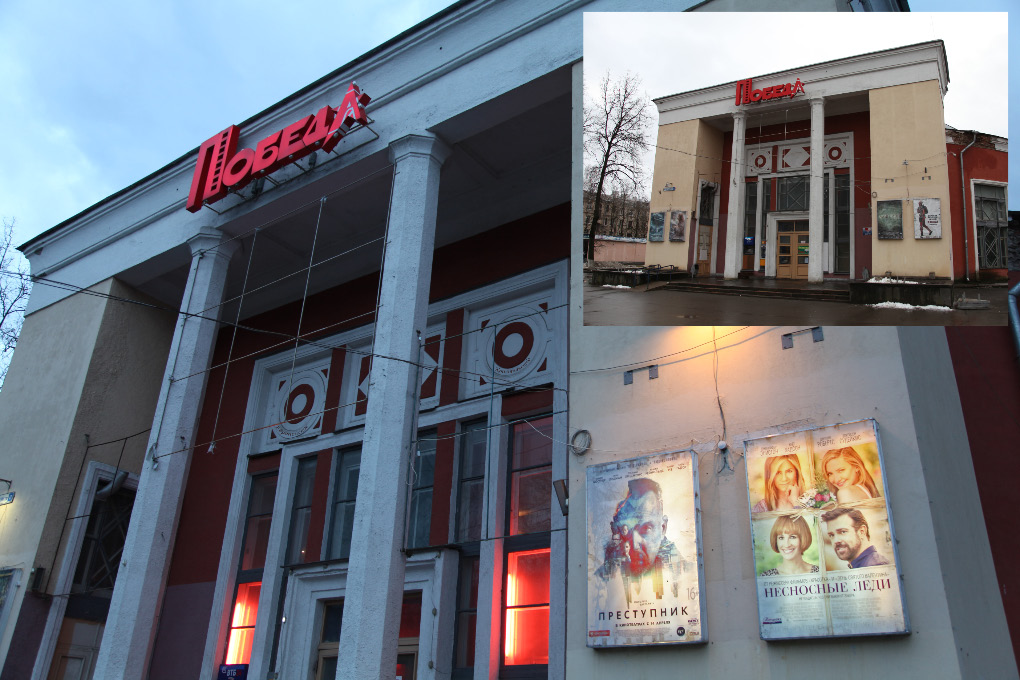 |
|
| |
Americanism–Hollywoodism, Jewish–American cultural hegemony is alive and well in the Russia of
Yeltsin – Berezovsky – Chubias – Potanin – Sachs – Nemstov – Deripaska – Prokhorov – Alekbarov – Blavatnik – Abramov – Mikhelson – Kuzmichov – Lisin – Vekselberg – Fridman – Shvidler – Gusinsky – Khan – Khodorkovsky – Abramovich – Rotenberg – Kogan . . .
(Nope, no pattern here.)
Even the minority of films now played in XXI century Russia which are not imported from Hollywood have nearly completely co-opted the Hollywood strategy of destroying Christian culture and civilizational integrity through the villainization of the Church and of Christians, with European-Heterosexual men being the very worst portrayed; promotion of the acceptance of homosexuality as normal and desireable; the sexualization of children; women as soldiers and the associated destruction of the instinct in men to protect women and children; and the rest of their demonaic and vile agenda.
No Победа – Victory for Christendom to be seen here. |
|
| |
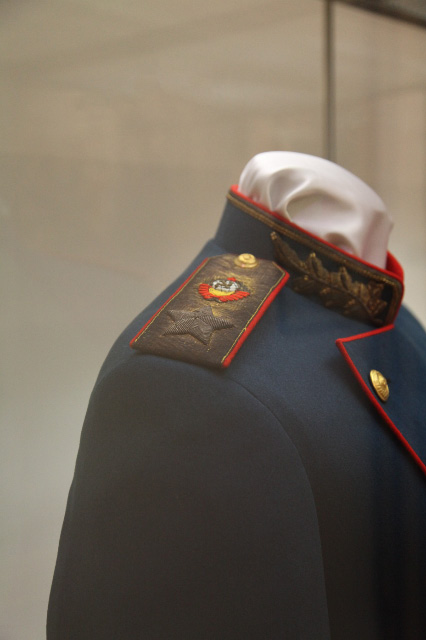 |
|
| |
Мундир парадный Маршала Советского Союза образца 1945г. Из личных вещей И.В. Сталина в Государственный Исторический Музей в Москве. Dress Tunic of 1945 of Marshal of the Soviet Union J.V. Stalin, from his personal belongings, in the State Historical Museum in Moscow. |
|
| |
|
|
|
|
|
|
| |
— Запнулся!—захохотал Ставрогин. — Нет, я вам скажу лучше присказку. Вы вот высчитываете по пальцам, из каких сил кружки составляются? Всё это чиновничество и сентиментальность — всё это клейстер хороший, но есть одна штука еще получше: подговорите четырех членов кружка укокошить пятого, под видом того, что тот донесет, и тотчас же вы их всех пролитою кровью как одним узлом свяжете. Рабами вашими станут, не посмеют бунтовать и отчетов спрашивать. Ха, ха, ха! |
|
“He is stuck,” laughed Stavrogin. “No, I'd better give you my version. There you reckon on your fingers the forces that make up the circles. All that business of titles and sentimentalism is a very good cement, but there is something better; persuade four members of the circle to do for a fifth on the pretence that he is a traitor, and you'll tie them all together with the blood they've shed as though it were a knot. They'll be your slaves, they won't dare to rebel or call you to account. Ha ha ha!” |
|
| |
|
|
|
|
from Бесы – Demons or The Devils or The Possessed, 1871-1872,
by Фёдор Михайлович Достоевский – Fyodor Mikhailovich Dostoyevsky
(* 30 October [N.S. 11 November] 1821 — 28 January [N.S. 9 February] 1881 †)
Часть вторая, Глава шестая – Part II, Chapter 6 |
|
|
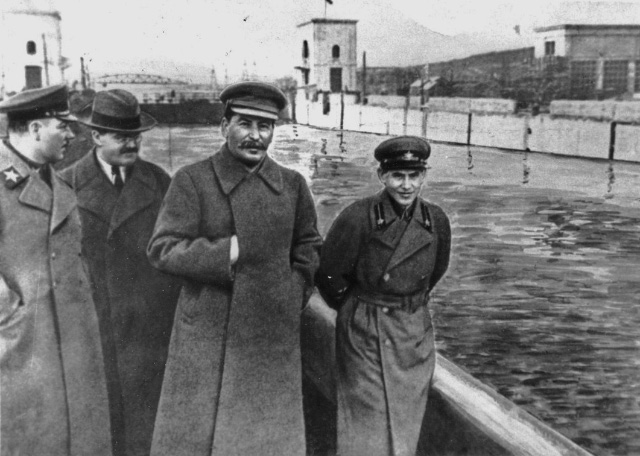 |
|
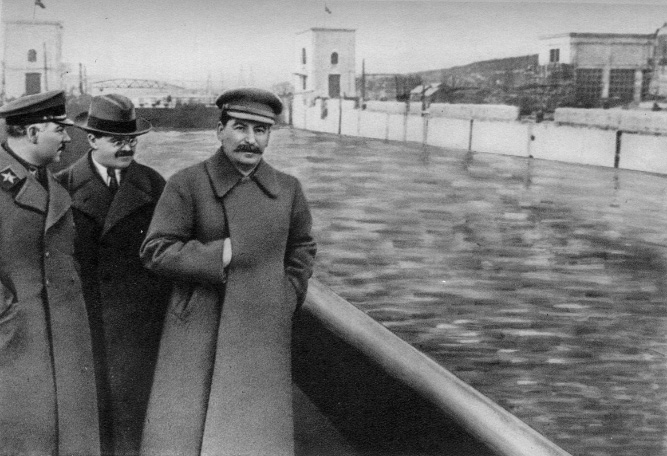 |
Николай Иванович Ежов – Nikolai Ivanovich Yezhov, The Malignant Dwarf, Jew and homosexual.
|
|
Stalin sans Yezhov. These two photos from Wikicommons and a thousand other places. Those with Stalin and not erased into non-existence are Вячеслав Молотов – Vyacheslav Molotov (1890 – 1986), of Molotov cocktail fame, whose longevity serves as one more reminder of the patent absurdity of the atheist-cum-Talmudic Jew prayer and purported belief that wickedness will needs be punished in this life, virtue rewarded. Pictured to the viewer's far left is Климент Ворошилов – Kliment Voroshilov (1881 – 1969), ditto. |
|
|
|
| |
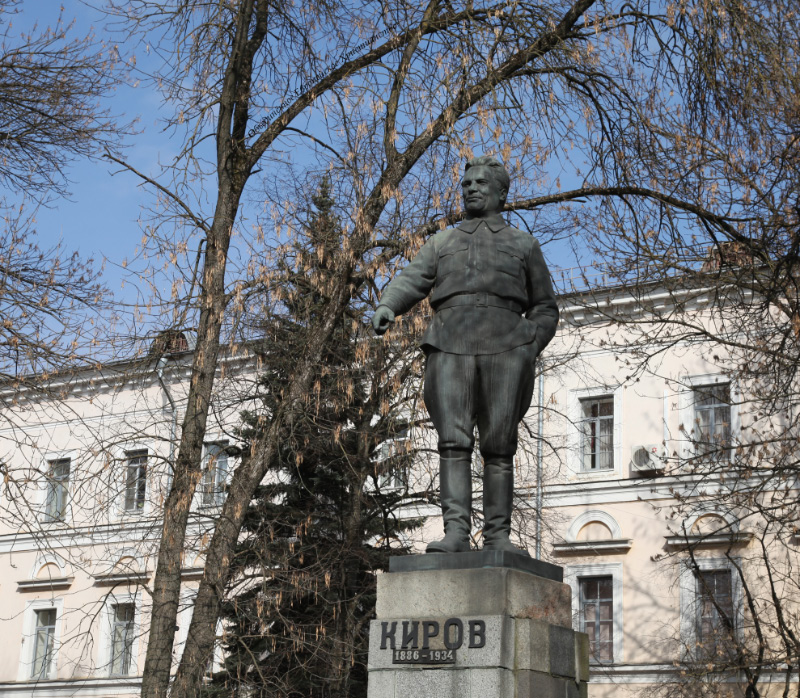 |
|
| |
Monument в Пскове – in Pskov to Sergei Mironovich Kirov – Сергей Миронович Киров (1886-1934), famous Russian ballet dancer – известный русский танцовщик балета. Photo 27 March 2016.
Joking aside, like the majority of that minority of Bolshevik leaders who were not themselves atheist or Talmudic Jews — and like President Franklin Delano Roosevelt's closest, and White House live-in, advisor, and Lend-Lease overloard, Harry Lloyd Hopkins (1890–1946) — Kirov had a Jewess wife, Мария Львовна Маркус – Maria Lvovna Marcus. Of course the examples are countless, but one thinks in this connection also of the Chekist (ОГПУ – OGPU) leader, Вячеслав Рудольфович Менжинский – Vyacheslav Rudolfovich Menzhinsky, predecessor of the two Jews:
- Генрих Григорьевич Ягода – Genrikh Grigoryevich Yagoda (born Енох Гершевич Иегуда – Yenokh Gershevich Iyeguda), like his fellow Jew, Kaganovich, one of the leading mass murdering monsters of the 1932-1933, minimum-seven-million-Christians-dead installment of the Голодомор – Holodomor – Terror Famine; and
- Николай Иванович Ежов – Nikolai Ivanovich Yezhov, The Malignant Dwarf, also a homosexual.
Although the polyglot Menzhinsky was Russian, and indeed of hereditary nobility, his wife, Алла Семеновна Адова – Alla Semenovna Adowa, was a Jewess. Like Molotov's "Полина Семёновна Жемчужина – Polina Semyonovna Zhemchuzhina," actually born Perl Karpovskaya, and Voroshilov's Екатерина Давидовна – Ekaterina Davidovna, actually born Гитля Горбман – Gitl Gorbman.
Expressions like disproportionate representation are inadequate. Bolshevism, and with its hundred million murdered Christians (more if the Chinese and other Asian Communist movements are included in the figures), was an athiest-cum-Talmudic Jew phenomenon, from top to bottom, from the first to the last, to its shift westward in the 1970s to the Frankfurter School and the American Neo-Conservatives and their pretend enemies, the Liberal-Progressive Modernists-cum-Homosexualists, all Jew phenomena. |
|
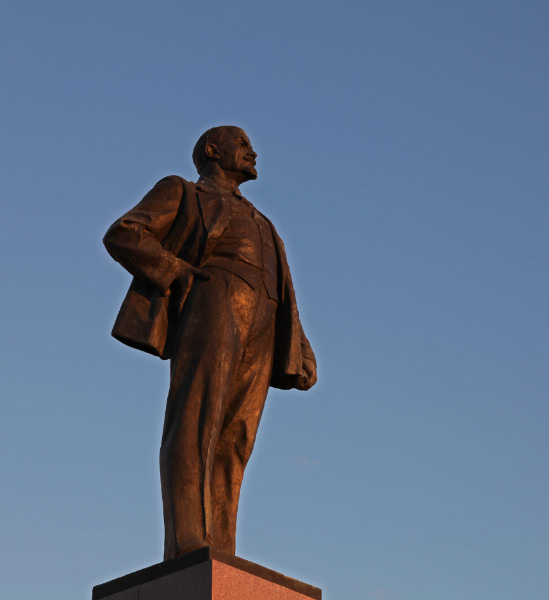 |
|
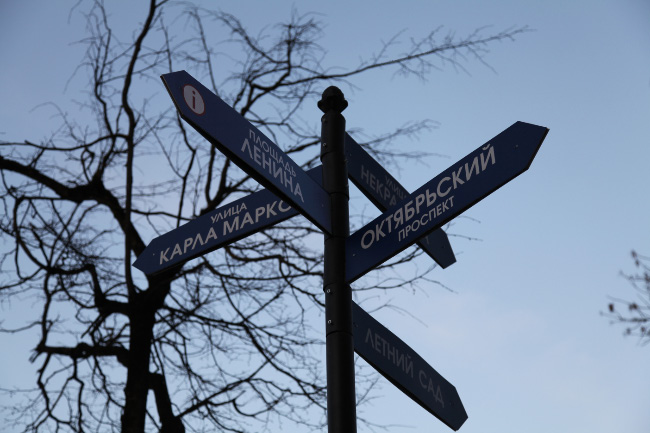
|
Poor Mr. Lenin seems to be distressed by some lower back pain. Perhaps it is caused by his Syphillis?
|
|
Pskov — after all, there is no one else for the authorities to honor, still in 2016, right?
Really Gentlemen and Ladies, there are no scientists, engineers, industrialists and builders, architects and artists, or writers or music composers to single out for honor with a street name? Nearing the end of the second decade of the XXI century, it is still necessary and good to honor Marx and Lenin and Sverdlov and their ilk, and their Godless, murderous movements in this way, or in any way? |
| |
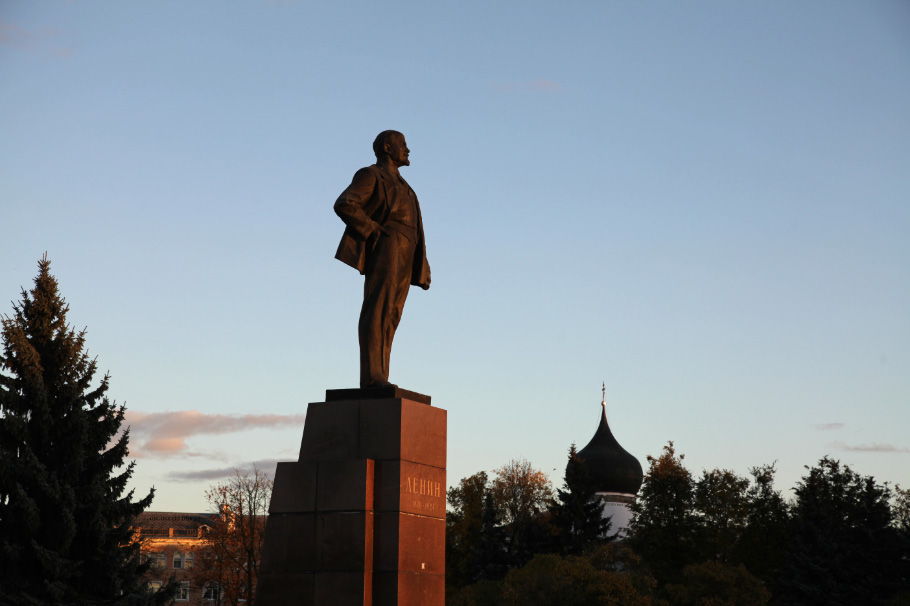 |
|
| |
Lenin still hovering over the cupolas of the Храм Архангелов Михаила и Гавриила – Church of the Archangels Michael and Gabriel |
|
| |
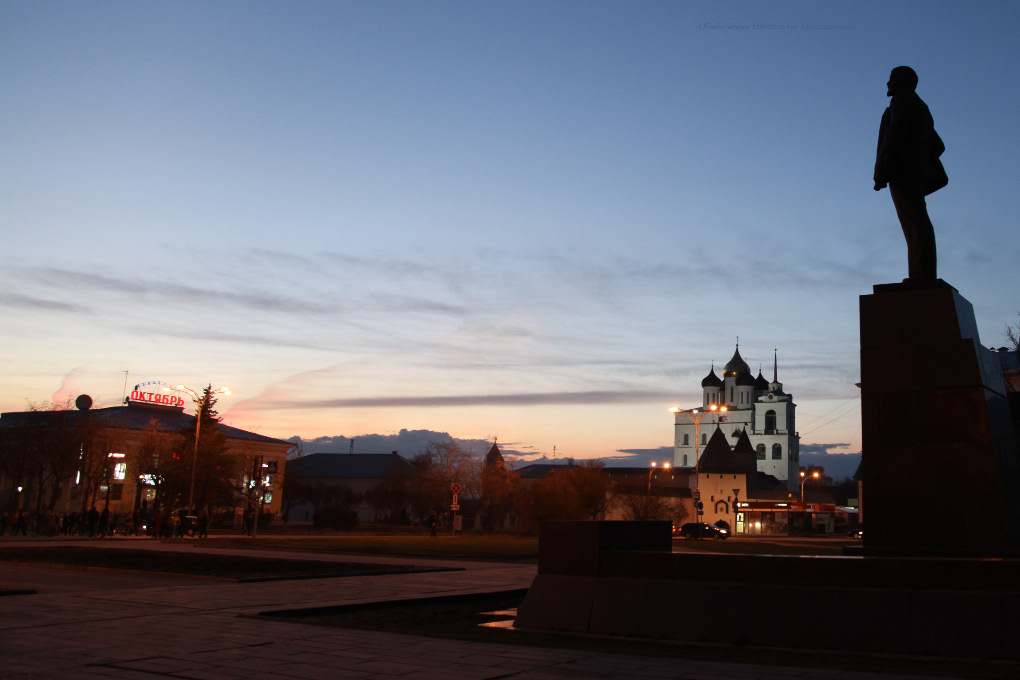 |
|
| |
More October Revolution than some constitutional monarchist Octobrist – Октябристы (Союз 17 Октября – Union of October 17), to put the point mildly, and Lenin presides over the whole scene, including the Trinity Cathedral in the Pskov Kremlin, and still in late 2016. The placement of this movie theater in Pskov was no accident. The Bolsheviks in Russia understood quickly the power that this medium has over hearts and minds, as of course their co-spiritualists and co-ethno-religionists in Hollywood understood from the first. Though in Hollywood the Production Code (the Hays Code) did provide some check during the years from 1930 to 1968 on what the enemies of Church and Christendom hoped to accomplish, though query whether this hiatus only allowed them time to hone their skills for a more effective attack later. In any case Vatican II so weakened the Church that by 1968 Christendom was easy pickings. |
|
| |
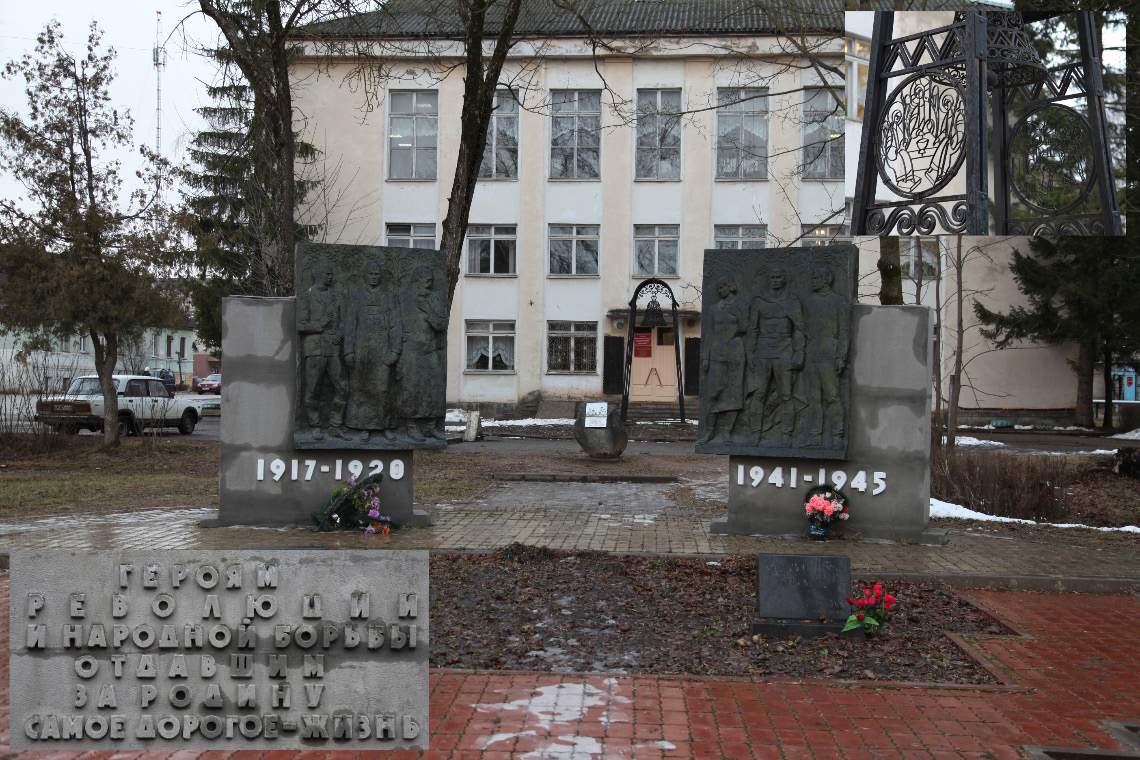 |
|
| |
Ну, есть определенная симметрия ... в обмане и зла, 1917 по 1920 и 1941 по 1945 год. « Героям Революцим и Народной Борьбы Отдавшим за Родину Самое Дорогое - Жизнь. » Памятник в Порхове Псковской области. И непосредственно за ним находится железное изделие с изображением Троицы А. Рублёва. — Попробуйте совместить несовместимое, или покаяние, что деды погибли и убили ни за что ... или во зло.
Well, there is a certain symmetry ... in deception and evil, 1917 to 1920 and 1941 to 1945. "Heroes of the Revolution and the people's struggle for their homeland gave the most precious - life." Monument in Porkhov, Pskov Oblast. And directly behind it, an ironwork with image of A. Rublev's Trinity. — Try to reconcile the irreconcilable, or repentance that grandfathers died and killed for nothing ... or for evil. |
|
|
|
|
| |
Коммунисты звезды на вершине башни Московского Кремля – Communists stars atop the towers of the Moscow Kremlin |
|
| |
самые заметные исторические башни во всей России – the most visible historic towers in all of Russia |
|
| |
не 1966, но 2016 – not 1966, but 2016 |
|
| |
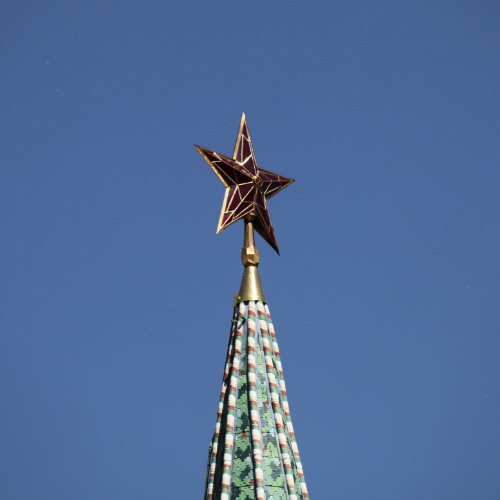 |
|
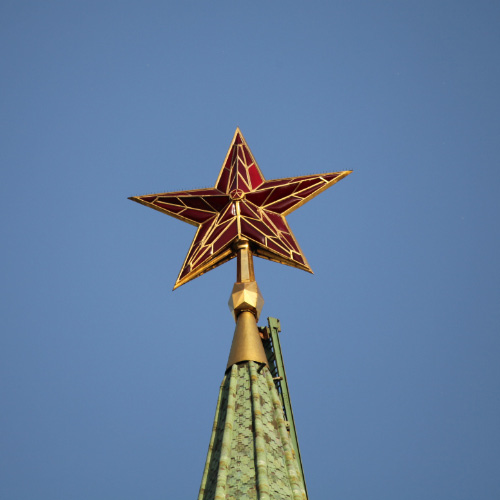 |
|
| |
Savior Tower – Спасская Башня – Spasskaya Tower |
|
Trinity Tower – Троицкая Башня – Troitskaya Tower |
|
| |
Russia and the Russian Orthodox Church do stand in a special position as regards the dialogues among the Oriental Orthodox, the Orthodox and the Catholics and as regards the process of Christian and ecclesiological re-unification, and this not only because in Realpolitik they are actually and potentially a whole lot more numerous than the Greeks. So too within European Christendom, the Russians are special, and they have a special and in important senses leadership role to play.
To many Descendants of European Christendom other than Russians the forgoing may seems strange. Indeed to play a holy role the Russians will need to rethink and change much within themselves, not least the mass fashion in recent decades to try to view the atheist Communist period as somehow a continuation of and in continuity with — rather than an abominable interruption from — Russia's holy role within European Christendom and Christendom universal. Embracing evil in order to manufacture martyrs is not worthy of the least among Christian societies. Lapsed- or atheist- Jews may have started ... well, clearly did start and lead Bolshevism. Equally clear is that they could not have and did not do it alone. As difficult as it may be to acknowledge this about one's grandfathers and fathers, how can there be reconciliation, much less leadership, without truth? |
|
| |
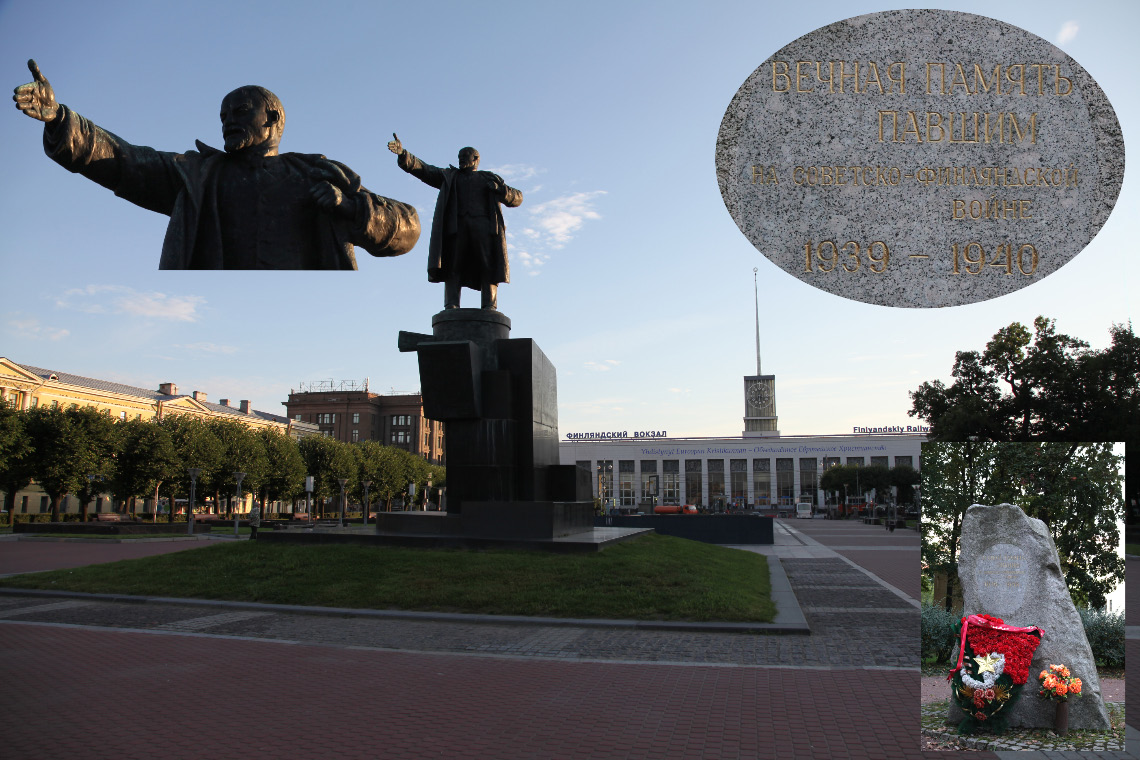 |
|
| |
| Ленин – Lenin |
| at |
| Финляндский вокзал в Санкт-Петербурге – Finland Station in Saint Petersburg |
| |
What nice, friendly chaps, that fellow Lenin and his brother Bolsheviks.
Photo from 8 VIII 2015. |
|
|
Вечная Память
Павшим
на советско-финляндской
Войне
1939 - 1949 |
|
Eternal Memory
for the Fallen
in the Soviet-Finnish
War
1939 - 1949 |
| |
|
|
| The monument pictured above inlayed is in fact located in an obscure corner of Saint Petersburg near the entrance to a naval training school. And consider please that all of our countries of European Christendom honor our fallen in this way, even those fallen in unjust wars. Photos of monument from 27 IX 2015. |
|
|
|
|
|
| |
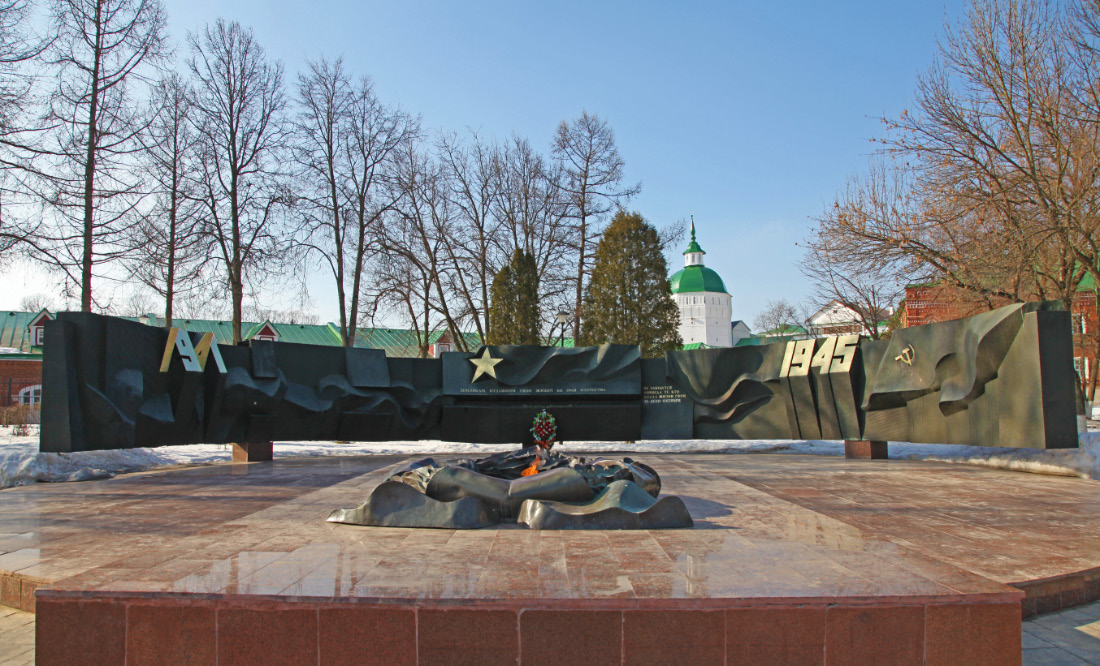 |
|
| |
If one is actually speaking of the Second World War, the beginning of that war may quite convincingly be dated to 17 de julio de 1936 and the start of the Spanish Civil War, in which Communist ideology and Soviet military assistance figured so prominently. Another possible dating would be to July of 1937 and the commencement of the full-scale hostilities of the Second Sino-Japanese War (7 July 1937 – 9 September 1945), in which hostilities the Soviet Union also participated and from 1937 (Советские Добровольцы в Китае). With perhaps 2.7 military deaths on all sides and as many as 22 million Chinese civilians killed, this war, from a world perspective, is hardly the minor footnote that it may seem to most Descendants of European Christendom. At all events the Second World War - Вторая Мировая Война did not begin for the Soviet Union — for Russia, the Ukraine, or Belarus — in 1941, though countless thousands of major monuments throughout Russia, the Ukraine and Belarus, including this large one right next to the Lavra in Russia's spiritual capital of Sergiev Posad, contain this lie written in stone and in steel. For the Soviet Union the European War began in 1939, and the Soviet forces began it. In this massive Soviet war of aggression, the Red Army, the military forces of the Soviet Union, attacked (that is, started murdering people in):
- Poland on 17 September 1939;
- Finland on 30 November 1939 (the Winter War - Talvisota - Vinterkriget - Зимняя Война of 30 November 1939 to
13 March 1940, in which tiny Finland cleaned the giant Soviet Union's clock);
- Estonia and Latvia and Lithuania between 14 and 16 June 1940 (Estonia under the command of Andrei Zhdanov, lovely).
Within a few days there were 500,000 Red Army troops in these three countries; and
- Moldova (Bessarabia and northern Bukovina) on 28 June 1940.
The circumstance can be left to another day and webpage for exploration that, when Nazi Germany commenced their invasion of the Soviet Union on 22 June 1941 in their Operation Barbarossa - Fall Barbarossa of unprecedented scale, Germany progress east was so swift because Red Army forces were arrayed not to optimize effective defence from invasion but rather for their own invasion in the other direction. Part of any such discussion would also have to include an examination of the hypocrisy of the American Presidents Wilson and Roosevelt and Über Alles the hypocrisy and self-dealing of Winston Leonard Spencer-Churchill and his most deliberate schemes to convert a brief local European war into the World War, his second, which left 50 to 80 million dead, the ascendancy of world Communism with tens of millions more dead, and the extinction-level-event threat which was the Cold War.
The forgoing sentences may seem to the reader at first blush to be out of place on a website dedicated to the re-unification of the Orthodox-Catholic Church, as to the re-establishment of civilizational integrity within Christendom, beginning with European Christendom. Those who reflect more thoroughly on the poisonous role of nationalism/chauvinism both as a heresy within the Church — sometimes labelled Ethnophelitism — as also in the process achieving meaningful civilizational integrity governed and restrained by subsidiarity. Less than two months forward from this 22 March 2015 writing, the Russians will be celebrating a 70th anniversary of the 7/8 May 1945 V-E Day, when those for whom it is personally expedient will attempt, and doubtless with a large measure of success, to use this central identity-forming event to buttress and rejuvenate an enormously exaggerated and artificial sense of separateness — separateness from their genetic and spiritual kin in the rest of European Christendom — or better yet actual siege mentality, within the minds of Homo Sovieticus (plural Homo Sovietica?). Orthodox Christian Russians and Orthodox Christian Russia deserve better. |
|
| |
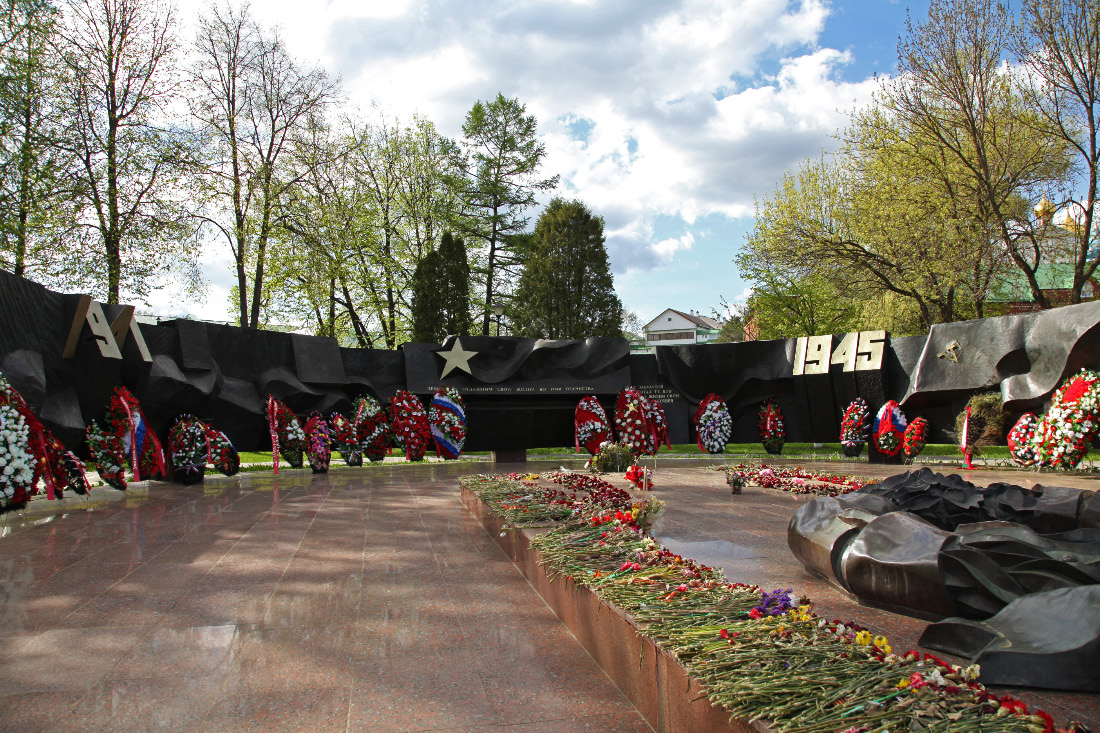 |
|
| |
Sergiev Posad on 14 May 2015 |
|
| |
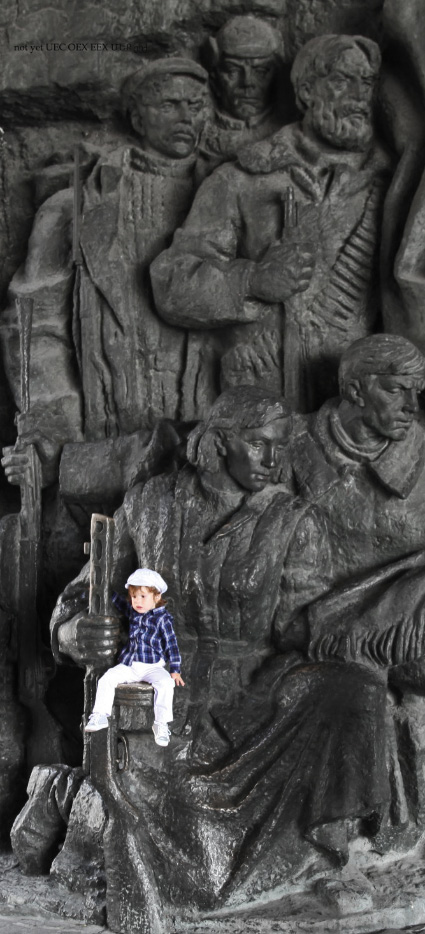 |
|
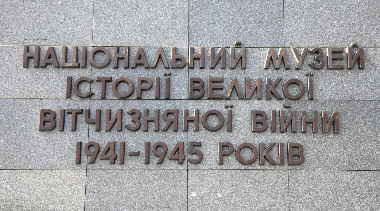
«Національний Музей Історії Великої Вітчизняної Війни 1941–1945 Років» – National Museum in Kiev of the History of the Great Patriotic War 1941 - 1945 though one reads that in 2015 the name was changed to the more honest «Національний Музей Історії України у Другій Світовій Війні» – Museum of The History of Ukraine in World War II |
|
|
|
|
| |
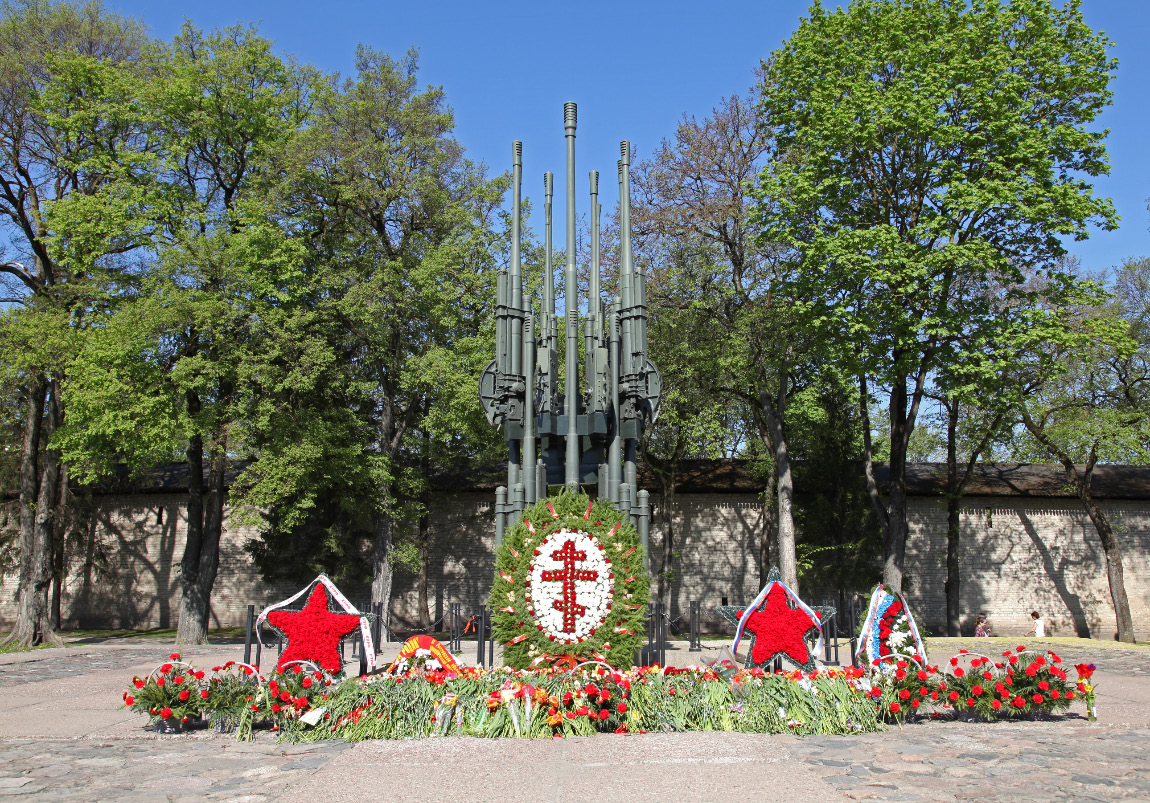 |
|
| |
Pskov on 10 May 2016 |
|
| |
Orthodox Cross and Communist Stars |
|
| |
What percentage of the monks of the Russian Orthodox Church completely conflate ignorant Russian chauvinistic nationalism with orthodox Christianity? |
|
| |
True, the contemporary diseases of masses of Catholic clerics — homosexualism and homosexuality — are even worse. |
|
| |
This circumstance does not make nationalism wise or holy. But perhaps more than unholy, nationalism is simply unworthy. |
|
| |
It is absurd. |
|
| |
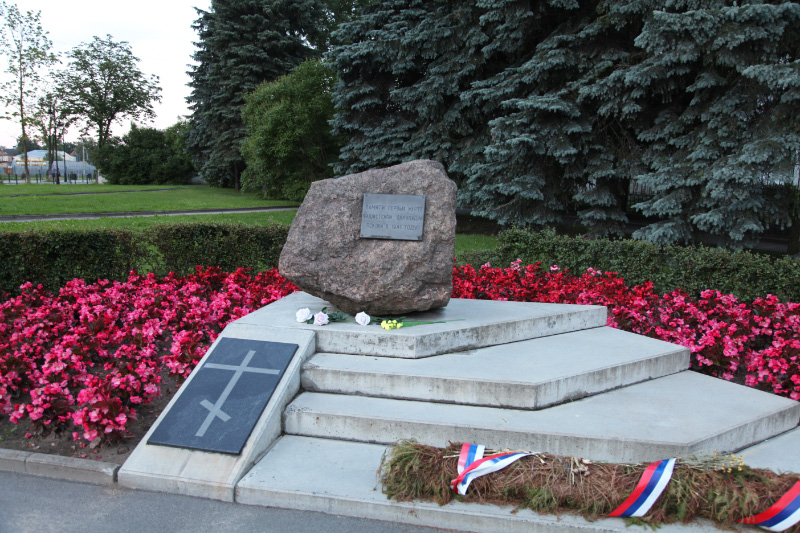 |
|
| |
World War II morphed into some holy struggle of Orthodox Rus' against "The West"?
Though in truth the plaque only reads: "To the Memory of the First Victims of Facist Occupation of Pskov in 1941." |
|
| |
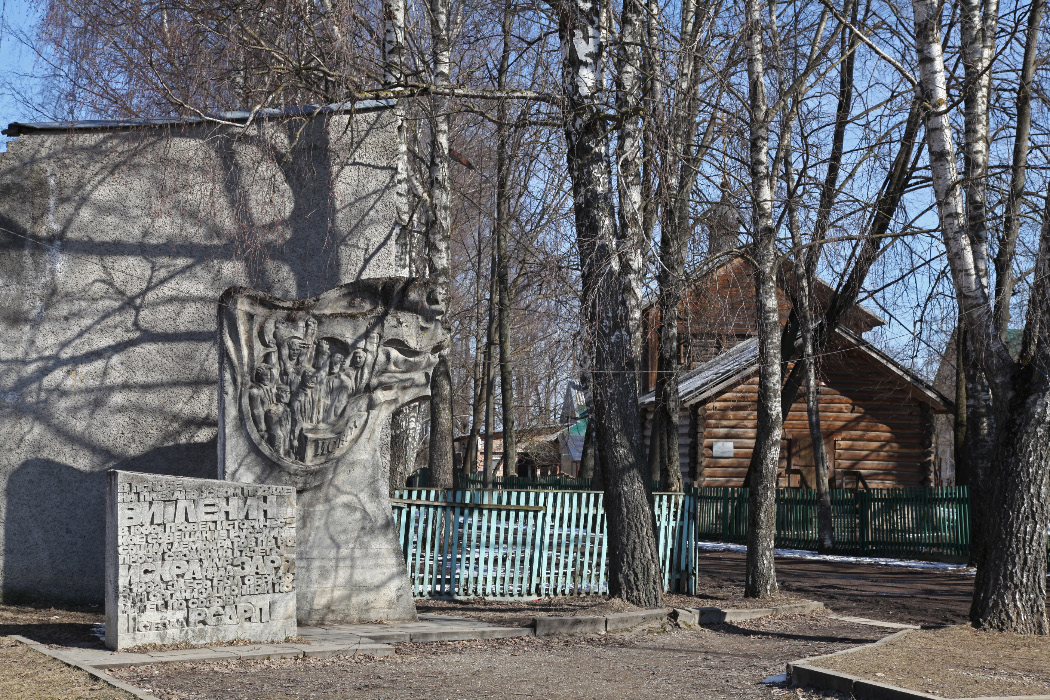 |
|
| |
Mix and match in Pskov: Lenin's Iskra – the Spark and a wooden Church |
|
|
|
|
| |
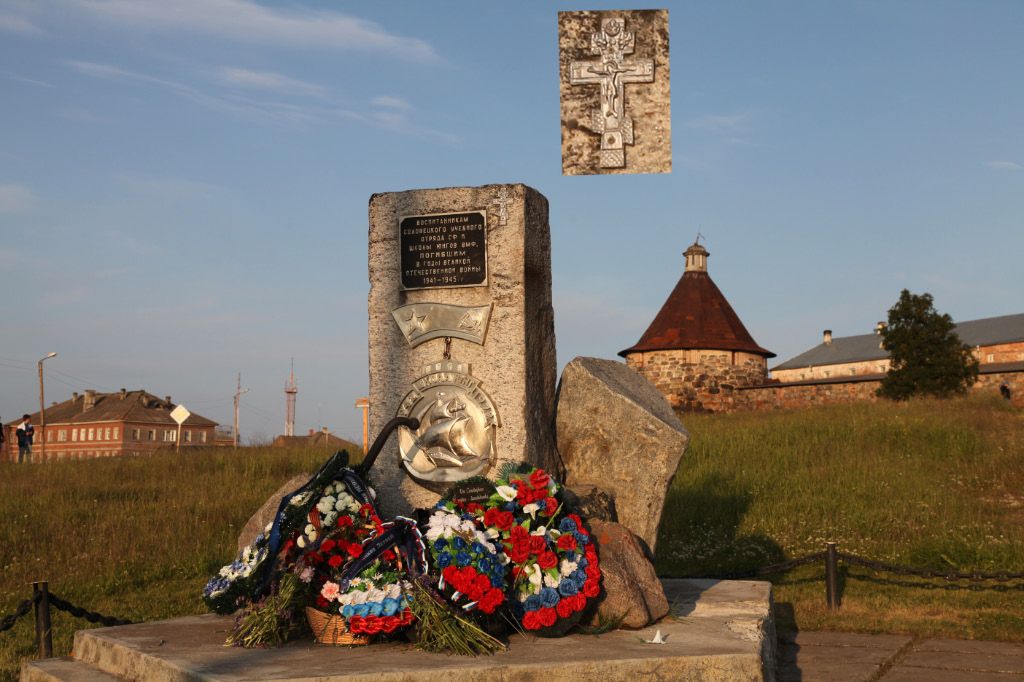 |
|
| |
The Orthodox Christian Cross afixed to the memorial for the Bolshevik-Communist-Jew- inspired/created Великая Отечественная Война – Great Patriotic War is all the more striking and ironic here, at the Спасо-Преображенский Соловецкий монастырь – Holy Transfiguration Solovetsky Monastery, as the monastery was closed, the monks martyred and the Island turned into one of the more important "labor" camps within the system the world has come to know as the
| Главное Управление Лагерей — ГУЛАГ |
| Glavnoye Upravleniye Lagerey – Main Camp Administration — the GULAG |
Estimates of the number of people murdered through the hundreds of camps of the Communist camp system rarely dip below the 2,000,000 figure, and some credible estimates reach to 10,000,000. (Obviously, the official estimates off of Soviet statistics can not be trusted.) What is more, the camp on the Solovetsky Islands — Соловки – Solovki, technically, Соловецкий лагерь особого назначения (СЛОН) – Solovetsky Special Purpose Camp (SLON) — was, to quote Александр Исаевич Солженицын – Aleksandr Isayevich Solzhenitsyn, the very Mother Camp, the prototype for the whole system.
Of course little efforts like attaching an Orthodox Cross to a Soviet memorial, common as such are even in the second half of the second decade of the XXI century, must be understood in context. Russia is full of a very great many of European Christendom's very finest people. And the enterprise which is United European Christendom needs Russia. Still, it is disheartening in ways that are difficult to describe that, very much like with the Catholics in Western Europe and the Americas, some of the worst people in Russia are those one encounters in the Church. the ignorant and malevolent, the chauvinistic and nationalistic counterparts, so to speak, of the heterodox and homosexualists which polute the Holy Catholic Church.
Efforts to see some kind of contrived continuum of Orthodoxy–Communism–Orthodoxy, with a transmogrified view of history in which World War II becomes some kind of holy Orthodoxy struggle, undermine the value of Big O Orthodoxy's contribution to the Church and Christendom, past and future. And they are ridiculous.
It seems that the Liberals and the Neo-Conservatives of the United States of America do not, in the end, have a monopoly on Schizophrenia, psychopathology and the moronic.
Returning for a moment to matters related to the ГУЛАГ – GULAG, |
|
| |
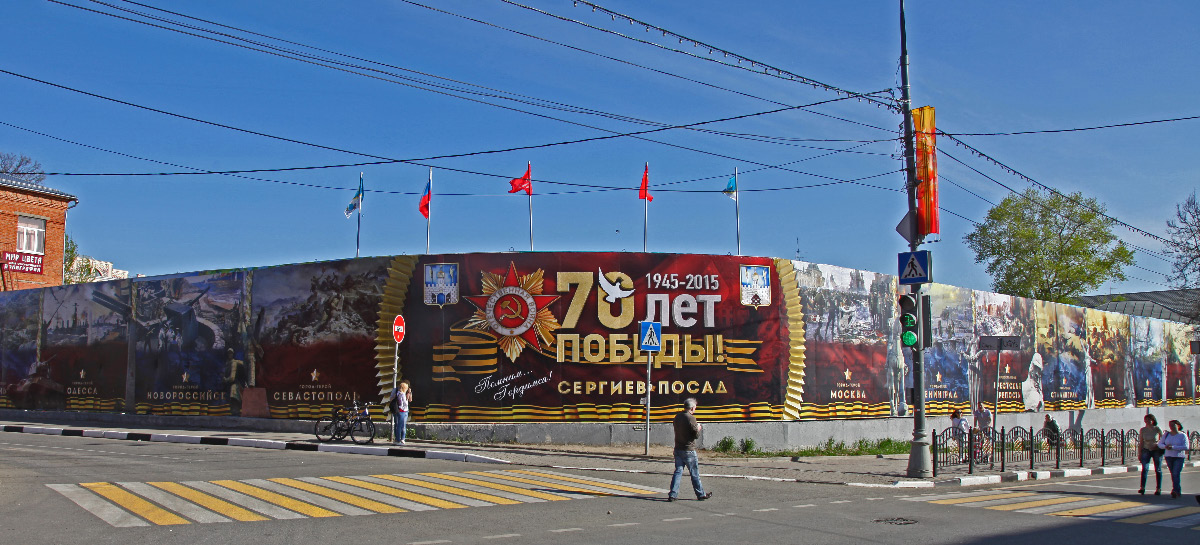 |
|
| |
70 Лет Победы! – 70 Years of Victory! Maybe if we can make our own people continue to derive their self-identities from this war — seventy years on — they will forget both that our war would not have happened but for our embrace of Bolshevism and that they are only paid 250€ (15,000 rubles) per month in 2015! In our new society the chief beneficiaries, those consuming the lion's share of the spoils, are not Russia's productive people (or even their managers), but rather persons in political and police force positions which empower them to prevent productivity. |
|
| |
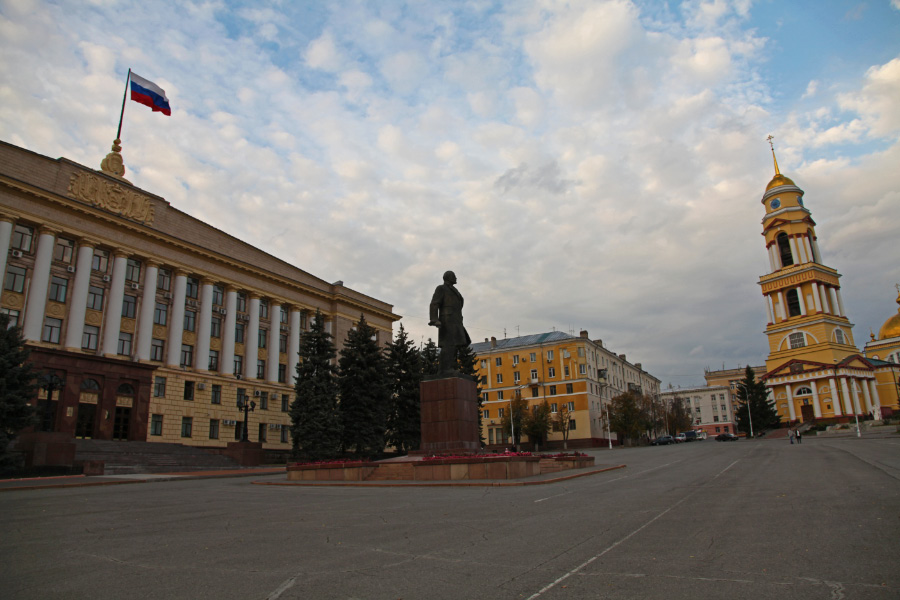 |
|
| |
Ленин в Липецке – Lenin in Lipetsk.
Trying to reconcile the irreconcilable, to find continuity where repentance and permanent break should be,
countless thousands of monuments to this monster continue to soil the scenery of Russia in 2015, often in
the central-most town squares, as with this one in Lipetsk.
Пытаясь примирить непримиримое, найти преемственность, где покаяние и постоянное перерыв должен быть,
многие тысячи памятников этого монстра продолжать почвы пейзажами России в 2015 году, часто в
Центрально-большинства городских площадях, так как это один в Липецке. |
|
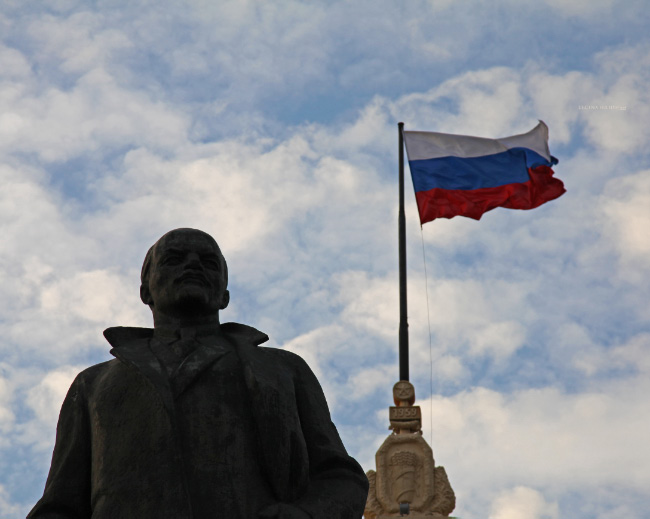 |
|
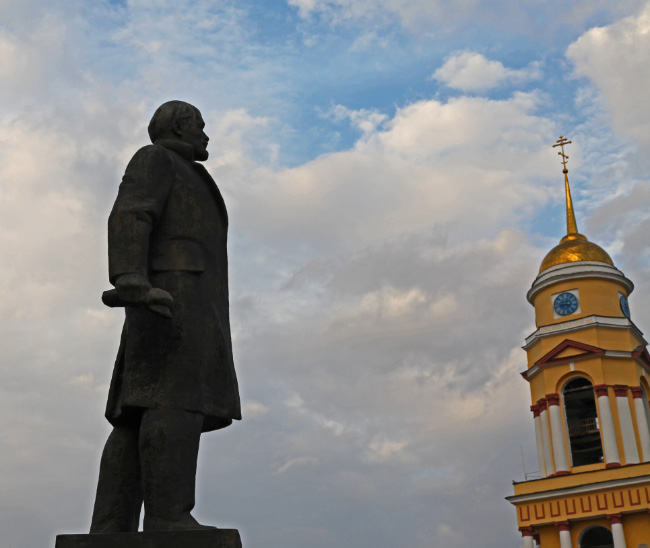 |
| |
|
Липецке – Lipetsk |
|
|
|
| |
три с половиной человека — Communist Beginnings Three and a half men, all murderer wanna-be's, with no real abilities |
|
| |
|
|
|
|
| |
— Это нелепость! — завопил Шатов, — я объявил честно, что я расхожусь с ними во всем! Это мое право, право совести и мысли... Я не потерплю! Нет силы, которая бы могла... |
|
“That's absurd!” cried Shatov. “I've told them honestly that I've cut myself off from them in everything. That is my right, the right to freedom of conscience and of thought. . . . I won't put up with it! There's no power which could . . .” |
|
| |
|
|
|
|
| |
— Знаете, вы не кричите, — очень серьезно остановил его Николай Всеволодович, — этот Верховенский такой человечек, что может быть нас теперь подслушивает, своим или чужим ухом, в ваших же сенях пожалуй. Даже пьяница Лебядкин чуть ли не обязан был за вами следить, а вы может быть за ним, не так ли? Скажите лучше: согласился теперь Верховенский на ваши аргументы или нет? |
|
“I say, don't shout,” Nikolay Vsyevolodovitch said earnestly, checking him. “That Verhovensky is such a fellow that he may be listening to us now in your passage, perhaps, with his own ears or some one else's. Even that drunkard, Lebyadkin, was probably bound to keep an eye on you, and you on him, too, I dare say? You'd better tell me, has Verhovensky accepted your arguments now, or not?” |
|
| |
|
|
|
|
| |
— Он согласился; он сказал, что можно, и что я имею право... |
|
“He has. He has said that it can be done and that I have the right . . . .” |
|
| |
|
|
|
|
| |
— Ну, так он вас обманывает. Я знаю, что даже Кириллов, который к ним почти вовсе не принадлежит, доставил об вас сведения; а агентов у них много, даже таких, которые и не знают, что служат обществу. За вами всегда надсматривали. Петр Верховенский между прочим приехал сюда за тем, чтобы порешить ваше дело совсем, и имеет на то полномочие, а именно: истребить вас в удобную минуту, как слишком много знающего и могущего донести. Повторяю вам, что это наверно; и позвольте прибавить, что они почему-то совершенно убеждены, что вы шпион, и если еще не донесли, то донесете. Правда это? |
|
“Well then, he's deceiving you. I know that even Kirillov, who scarcely belongs to them at all, has given them information about you. And they have lots of agents, even people who don't know that they're serving the society. They've always kept a watch on you. One of the things Pyotr Verhovensky came here for was to settle your business once for all, and he is fully authorised to do so, that is at the first good opportunity, to get rid of you, as a man who knows too much and might give them away. I repeat that this is certain, and allow me to add that they are, for some reason, convinced that you are a spy, and that if you haven't informed against them yet, you will. Is that true?” |
|
| |
|
|
|
|
| |
Шатов скривил рот, услыхав такой вопрос, высказанный таким обыкновенным тоном. |
|
Shatov made a wry face at hearing such a question asked in such a matter-of fact tone. |
|
| |
|
|
|
|
| |
— Если б я и был шпион, то кому доносить? — злобно проговорил он, не отвечая прямо. — Нет, оставьте меня, к чорту меня! — вскричал он, вдруг схватываясь за первоначальную, слишком потрясшую его мысль, по всем признакам несравненно сильнее, чем известие о собственной опасности: — Вы, вы, Ставрогин, как могли вы затереть себя в такую бесстыдную, бездарную лакейскую нелепость! Вы член их общества! Это ли подвиг Николая Ставрогина! — вскричал он чуть не в отчаянии. |
|
“If I were a spy, whom could I inform?” he said angrily, not giving a direct answer. “No, leave me alone, let me go to the devil!” he cried suddenly, catching again at his original idea, which agitated him violently. Apparently it affected him more deeply than the news of his own danger. “You, you, Stavrogin, how could you mix yourself up with such shameful, stupid, second-hand absurdity? You a member of the society? What an exploit for Stavrogin!” he cried suddenly, in despair. |
|
| |
|
|
|
|
| |
Он даже сплеснул руками, точно ничего не могло быть для него горше и безотраднее такого открытия. |
|
He clasped his hands, as though nothing could be a bitterer and more inconsolable grief to him than such a discovery. |
|
| |
|
|
|
|
| |
— Извините, — действительно удивился Николай Всеволодович, — но вы, кажется, смотрите на меня как на какое-то солнце, а на себя как на какую-то букашку сравнительно со мной. Я заметил это даже по вашему письму из Америки. |
|
“Excuse me,” said Nikolay Vsyevolodovitch, extremely surprised, “but you seem to look upon me as a sort of sun, and on yourself as an insect in comparison. I noticed that even from your letter in America.” |
|
| |
|
|
|
|
| |
— Вы... вы знаете... Ах, бросим лучше обо мне совсем, совсем! — оборвал вдруг Шатов. — Если можете что-нибудь объяснить о себе, то объясните... На мой вопрос! — повторял он в жару. |
|
“You . . . you know. . . . Oh, let us drop me altogether,” Shatov broke off suddenly, “and if you can explain anything about yourself explain it. . . . Answer my question!” he repeated feverishly. |
|
| |
|
|
|
|
| |
— С удовольствием. Вы спрашиваете: как мог я затереться в такую трущобу? После моего сообщения я вам даже обязан некоторою откровенностию по этому делу. Видите, в строгом смысле я к этому обществу совсем не принадлежу, не принадлежал и прежде и гораздо более вас имею права их оставить, потому что и не поступал. Напротив, с самого начала заявил, что я им не товарищ, а если и помогал случайно, то только так, как праздный человек. Я отчасти участвовал в переорганизации общества по новому плану, и только. Но они теперь одумались и решили про себя, что и меня отпустить опасно и, кажется, я тоже приговорен. |
|
“With pleasure. You ask how I could get into such a den? After what I have told you, I'm bound to be frank with you to some extent on the subject. You see, strictly speaking, I don't belong to the society at all, and I never have belonged to it, and I've much more right than you to leave them, because I never joined them. In fact, from the very beginning I told them that I was not one of them, and that if I've happened to help them it has simply been by accident as a man of leisure. I took some part in reorganising the society, on the new plan, but that was all. But now they've changed their views, and have made up their minds that it would be dangerous to let me go, and I believe I'm sentenced to death too.” |
|
| |
|
|
|
|
| |
— О, у них всё смертная казнь и всё на предписаниях, на бумагах с печатями, три с половиной человека подписывают. И вы верите, что они в состоянии! |
|
“Oh, they do nothing but sentence to death, and all by means of sealed documents, signed by three men and a half. And you think they've any power!” |
|
| |
|
|
|
|
| |
— Тут отчасти вы правы, отчасти нет, — продолжал с прежним равнодушием, даже вяло Ставрогин. — Сомнения нет, что много фантазии, как и всегда в этих случаях: кучка преувеличивает свой рост и значение. Если хотите, то, по-моему, их всего и есть один Петр Верховенский, и уж он слишком добр, что почитает себя только агентом своего общества. Впрочем основная идея не глупее других в этом роде. У них связи с Internationale; они сумели завести агентов в России, даже наткнулись на довольно оригинальный прием... но, разумеется, только теоретически. Что же касается до их здешних намерений, то ведь движение нашей русской организации такое дело темное и почти всегда такое неожиданное, что действительно у нас всё можно попробовать. Заметьте, что Верховенский человек упорный. |
|
“You're partly right there and partly not,” Stavrogin answered with the same indifference, almost listlessness. “There's no doubt that there's a great deal that's fanciful about it, as there always is in such cases: a handful magnifies its size and significance. To my thinking, if you will have it, the only one is Pyotr Verhovensky, and it's simply good-nature on his part to consider himself only an agent of the society. But the fundamental idea is no stupider than others of the sort. They are connected with the Internationale. They have succeeded in establishing agents in Russia, they have even hit on a rather original method, though it's only theoretical, of course. As for their intentions here, the movements of our Russian organisation are something so obscure and almost always unexpected that really they might try anything among us. Note that Verhovensky is an obstinate man.” |
|
| |
|
|
|
|
| |
— Этот клоп, невежда, дуралей, не понимающий ничего в России! — злобно вскричал Шатов. |
|
“He's a bug, an ignoramus, a buffoon, who understands nothing in Russia!” cried Shatov spitefully. |
|
| |
|
|
|
|
| |
— Вы его мало знаете. Это правда, что вообще все они мало понимают в России, но ведь разве только немножко меньше, чем мы с вами; и при том Верховенский энтузиаст. |
|
“You know him very little. It's quite true that none of them understand much about Russia, but not much less than you and I do. Besides, Verhovensky is an enthusiast.” |
|
| |
|
|
|
|
| |
— Верховенский энтузиаст? |
|
“Verhovensky an enthusiast?” |
|
| |
|
|
|
|
| |
— О, да. Есть такая точка, где он перестает быть шутом и обращается в... полупомешанного. Попрошу вас припомнить одно собственное выражение ваше: "Знаете ли, как может быть силен один человек?" |
|
“Oh, yes. There is a point when he ceases to be a buffoon and becomes a madman. I beg you to remember your own expression: 'Do you know how powerful a single man may be?' |
|
| |
|
|
|
|
| |
|
|
|
|
| |
|
|
from Бесы – Demons or The Devils or The Possessed, 1871-1872,
by Фёдор Михайлович Достоевский – Fyodor Mikhailovich Dostoyevsky
(* 30 October [N.S. 11 November] 1821 — 28 January [N.S. 9 February] 1881 †)
Часть вторая, Глава первая – Part II, Chapter 1 |
|
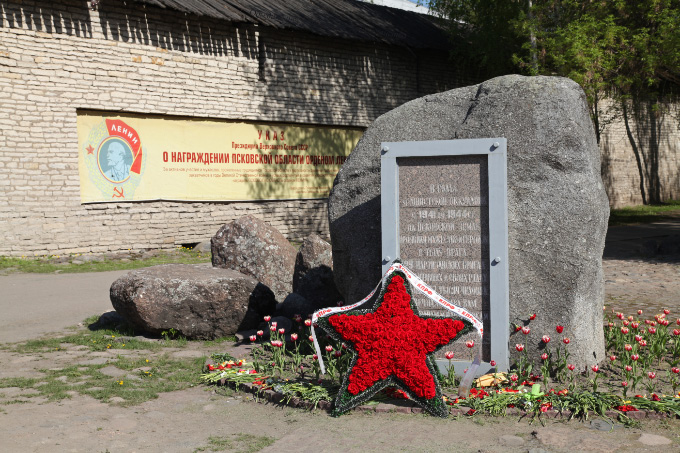 |
|
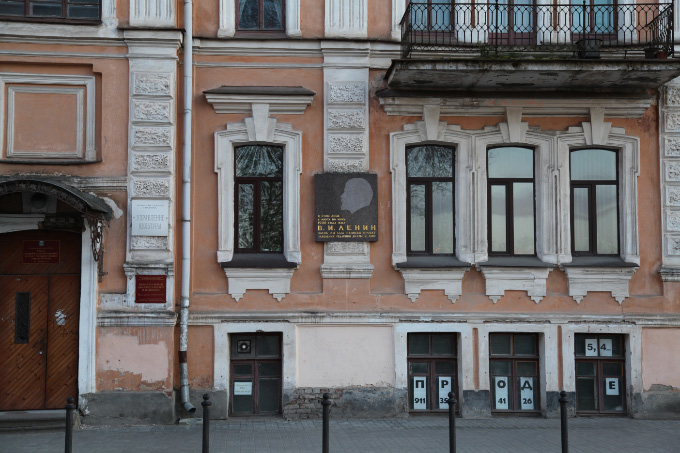 |
| On 10 May 2016 the Communist Partizans of 1941 to 1944 are celebrated next to the KPRF of the XXI c. |
|
The inscription reads, "In 1900 while launching The Spark, Lenin once took a shit here." |
| |
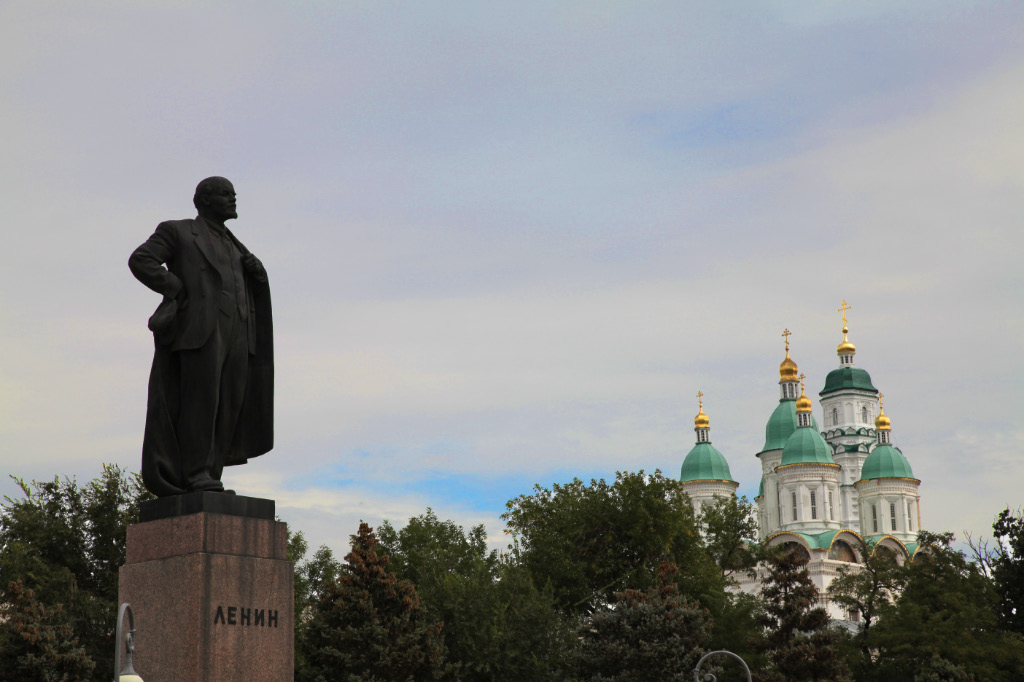 |
|
| |
24 сентября 2014 года Владимир Ленин все еще стоял высокий и, глядя свысока на Успенском соборе Астраханского кремля.
On 24 September 2014 Vladimir Lenin still standing tall and staring haughtily at the Dormition Cathedral of the Astrakhan Kremlin. |
|
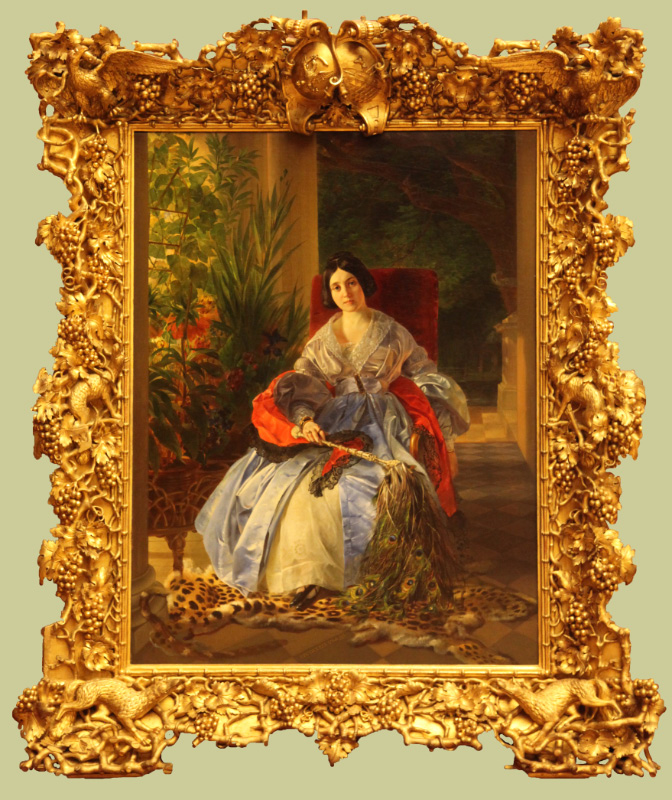 |
|
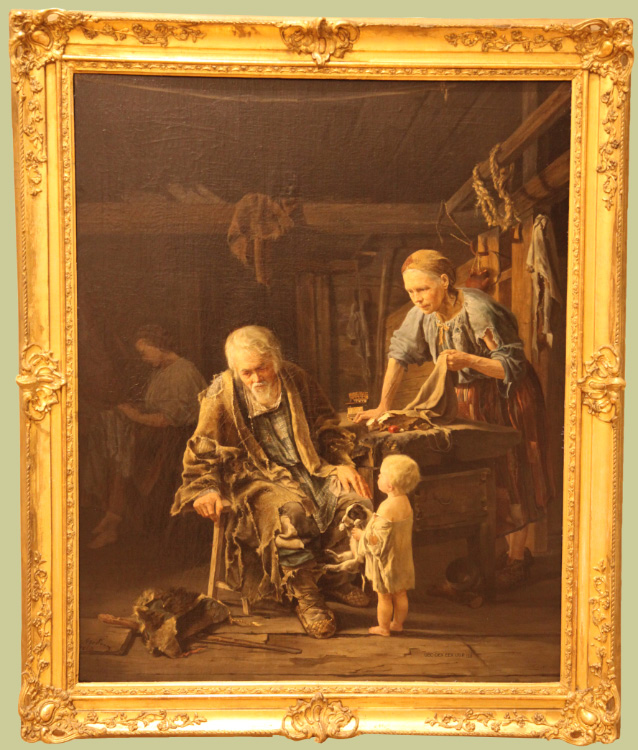 |
| Портрет светлейшей княгини Е.П.Салтыковой – Portrait of Her Most Serene Highness Princess Yelizaveta Saltykova by Карл Брюллов – Karl Brullov (1799 - 1852) |
|
Светлый Праздник Нищего – Beggar Man's Easter (1860) by В. И. Якоби – V. I. Jacobi |
| |
Pre-Revolutionary Holy Arrangements |
|
| |
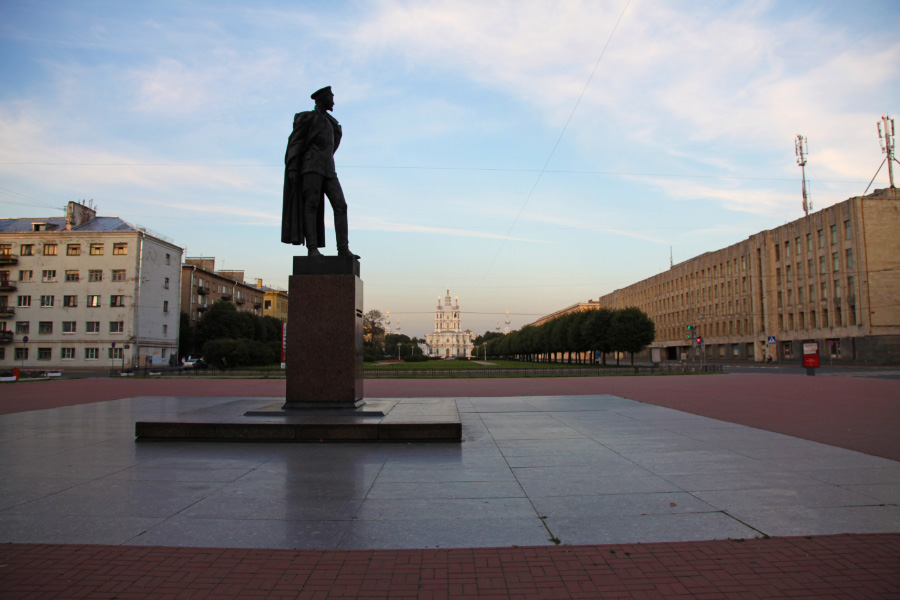 |
| |
|
Феликс Эдмундович Дзержинский – Felix Edmundovich Dzerzhinsky, ethnic Pole Bolshevik Chekist,
and director of the Cheka (Чрезвычайная Комиссия) and variously named successor organizations
from 1917 until his death from a heart attack at age 49 on 20 July 1926.
A significant minority, if not a majority, of Russians in не так Святая Русь - not so Holy Rus' would like to see
this mass murderer's huge monument returned also to Лубянская Площадь – Lubyanka Square in Moscow,
so of course it is eminently appropriate that he is honored here too, overlooking
Смольный Воскресения Христова Собор – Smolny Cathedral of the Resurrection of Christ.
Photograph from 21 August 2012. — Вам не стыдно? |
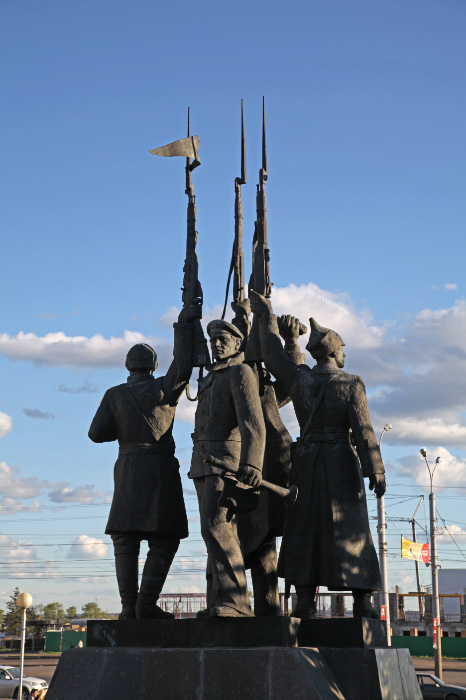 |
|
|
| Monument in Arkhangelsk celebrating the failure of the "foreign interventionists," that is, of other people's of European Christendom to aid the Christian forces within Russia in their attempt to defeat the atheist Bolsheviks and the regime of horror and mass murder they were in the throws of esconcing into the fabric of Russian society and the societies of huge Russia's hapless nearest neighbours. |
|
|
| |
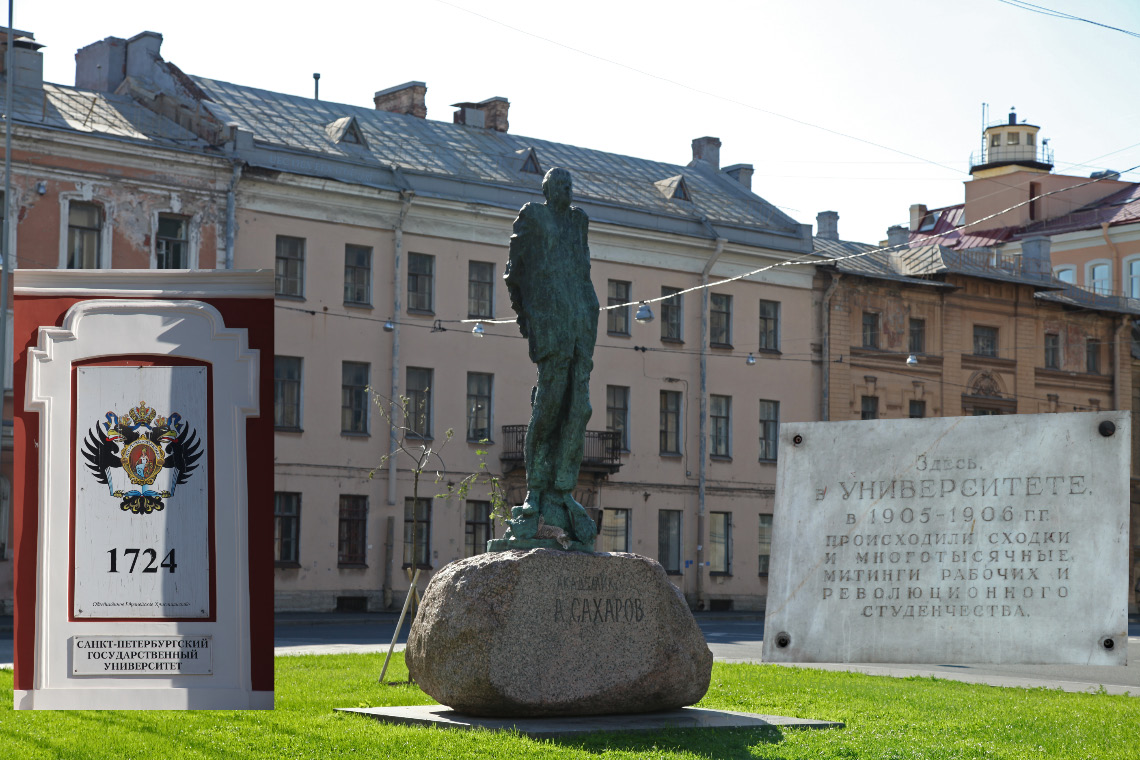 |
|
| |
In New York sure, but here we find А. Д. Сахаров – A.D. Sakharov (1921-1989) honored next to the main building of Russia's first university. Don't you see? Atheist Jews are not the Bolshevik vanguard. Oh no. They are the heroic dissidents against Communism. We must be grateful to them for liberating us all. |
|
|